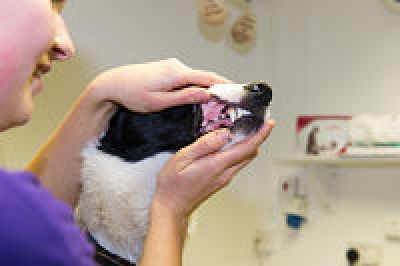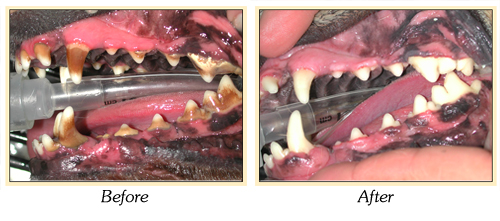
Posted By:
No one particularly likes going to the dentist, and certainly most of our pets aren’t too eager to let us look in their mouths for too long, but dental hygiene is very important to your pets overall health.
Everyday I’m asked how best to keep animals teeth clean and often how to improve their breath, but there’s a bit more to it than just wanting to admire some pearly whites! If our pets teeth aren’t looked after or kept clean, bacteria begin to multiple and form a sticky layer over the tooth’s surface known as plaque. Plaque is actually quite hard to see as it is often initially colourless. It is only when lots of plaque is deposited and it starts to mineralize does it become more obvious – at this stage it becomes known as calculus or more commonly tartar. Whilst plaque is easy to remove and prevent tartar is a different story and often requires professional dental cleaning.

(In the left image there is significant tartar present over all teeth (brown) with reddened inflamed gums (gingivitis). Unfortunately at this stage the only effective way to remove the tartar is via professional dental cleaning).
The presence of plaque and especially tartar on the teeth has health consequences far beyond just aesthetics and bad breath. They cause inflammation of the gum (gingivitis) and tooth root and can often lead to gross infection, abscess formation, gum recession and even possible infection of the bone leading to jaw fractures. These consequences cause variable tooth ache and ongoing pain and discomfort, not to mention loose and lost teeth. What is less apparent however is the effect of dental hygiene on the rest of the body. When there is such inflammation and infection present within the mouth it is inevitable that some of the bacteria and their toxins will get into the bloodstream; the mouth is after all highly vascular. The full consequences of these circulating bacteria and toxins is not yet completely understood, but it is thought that as the kidneys, liver, and brain filter the blood, small infections may occur causing permanent damage to these organs.
Additionally, what is quite striking is that oral hygiene has been linked to the development of oral cancer due to the constant inflammation caused within the mouth. Finally, in cats the presence of plaque and tartar on the tooth’s surface is involved in a common condition whereby the tissues and gums within the mouth become chronically inflamed. This is an extremely sore and painful condition whereby the affected cats often completely refuse to eat until treated is given . So, whilst it may just look and smell unpleasant, poor dental health can have both local effects within the mouth and far reaching significance.
However it is not all doom and gloom! The key to good dental health is to control the plaque before is becomes the more stubborn tartar and this may be achieved in a number of ways. The best way to do this, like in humans, is daily brushing of your animals teeth. Whilst this is an excellent way to keep those teeth healthy and prevent plaque, in some cases this just isn’t possible (it is best to begin young).
If teeth cleaning isn’t an option, be that due to the temperament of the animal or logistics, other options are available. Firstly, try to alter the diet. Avoid feeding solely wet food as feeding some dry kibble is a good way to help physically remove plaque. There are also diets designed specifically for dental health which will combine the physical removal of plaque due to the kibble with ingredients to help bind minerals and prevent tartar formation.
Secondly, chewing is often a very effective way for the teeth to self-clean and so encouraging your pet to chew is advised. This may be through the use of chew toys or other chew treats – be aware that although some such treats can work, if your pet is eating them quickly then their benefit is minimal. Often useful chew treats can include rawhide or even antlers as these don’t splinter but get worn down slowly; be aware of the extra calories in rawhide treats and the small risk of tooth fractures in antlers.
A third area is the use of supplements in your pet’s food/water. These come in the form of liquids, powders and chews and are often enzyme based; I have had mixed success with these.
So whilst dental disease may appear to affect just the mouth, once you scratch the surface you find that it can have consequences elsewhere. The best way to tackle this is to prevent/remove plaque before it becomes stubborn tartar, and this is achieved through diet alterations, encouraging chewing and/or enzymatic supplements.
As our feline friends get older there are a few conditions...
Another winter discussion group season is now behind...
We used a client’s new Morris Remote Control...
Itchy and sore skin is a common issue amongst our...
©2024 Shepton Veterinary Group Ltd., All rights reserved.
Privacy Policy • Terms & Conditions • Cookie Policy